November 25, 2019
New UNESCO Recommendation will Promote Access to Educational Resources for All.
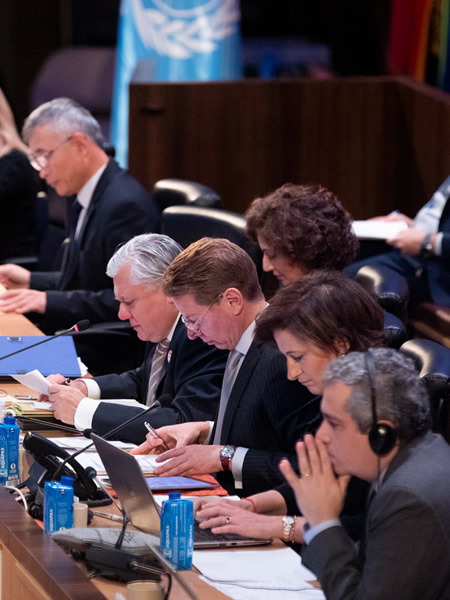
Photo: Plenary meeting of UNESCO General Conference in Paris. 25 November 2019. Image provided by & copyright © UNESCO/Christelle ALIX.
Paris, France, 25 November 2019 — An important step was taken towards quality education and access to information for all, as UNESCO’s General Conference adopted today a Recommendation on Open Educational Resources (OER).
This new Recommendation will support the development and sharing of openly-licensed learning and teaching materials, benefitting students, teachers, and researchers worldwide.
“The Recommendation on OER will contribute to the building of open and inclusive knowledge societies, and the achievement of the UN Sustainable Development Goals,” highlighted Mr. Moez Chakchouk, UNESCO Assistant Director-General for Communication and Information.
OER are learning, teaching, and research materials in any format and medium that reside in the public domain or are under the copyright released under an open license, which permit no-cost access, re-use, re-purpose, adaptation and redistribution by others.
The UNESCO Recommendation will support the creation, use, and adaptation of inclusive and quality OER, and facilitate international cooperation in this field. Its objectives also include the development of supportive policies and the creation of sustainability models for OER.
During the General Conference debates, several Member States from different world regions expressed their support to the Recommendation on OER, underlining its essential role in providing access to quality education on digital platforms. The discussion echoed the critical contribution of OER to the construction of open, inclusive, and participatory knowledge societies.
“I welcome the intersectoral cooperation around the Recommendation,” said Ms. Stefania Giannini, UNESCO Assistant Director-General for Education. “It shows how two Sectors can collaborate and support the Member States.” Ms. Giannini also highlighted that UNESCO had coined the term and concept of OER in 2002.
In his concluding remarks, Mr. Moez Chakchouk, Assistant Director-General for Communication and Information, announced the launch of a Dynamic Coalition to expand and consolidate commitments and strategies in the area of OER.
This Dynamic Coalition reflects the Ministerial Statement for the 2nd World OER Congress and will contribute to promoting and reinforcing international cooperation on the implementation of the Recommendation. UNESCO will work closely to support the Member States and other stakeholders in this regard.
|GlobalGiants.Com|







Edited & Posted by the Editor | 1:33 PM | View the original post
November 19, 2019
UNESCO is hosting the Forum of the Ministers of Culture
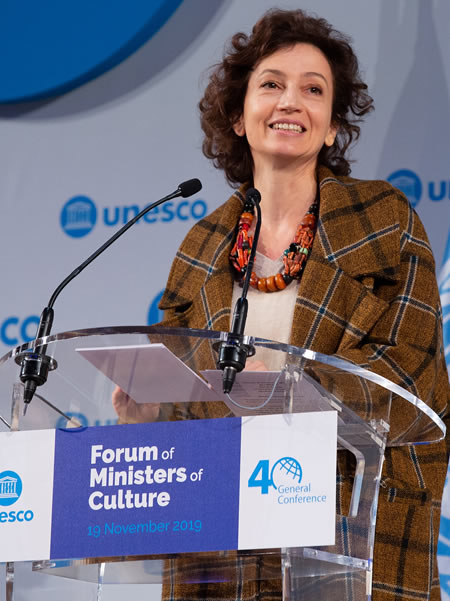
Photo: UNESCO Director-General, Audrey Azoulay, at the Opening of the Forum of Ministers of Culture. UNESCO Headquarters, Paris. 19 November 2019. Image provided by & copyright © UNESCO/Christelle ALIX.
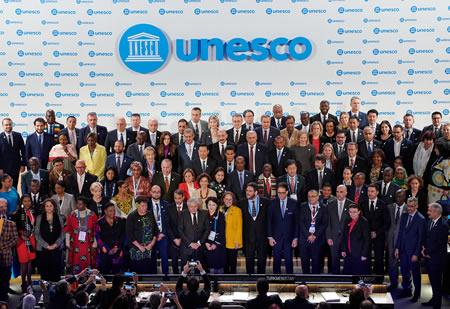
Photo: A Group Photograph of the Ministers of Culture with the UNESCO Director-General at the UNESCO Headquarters in Paris, France. 19 November 2019. Image provided by & copyright © UNESCO/Luc Valigny.
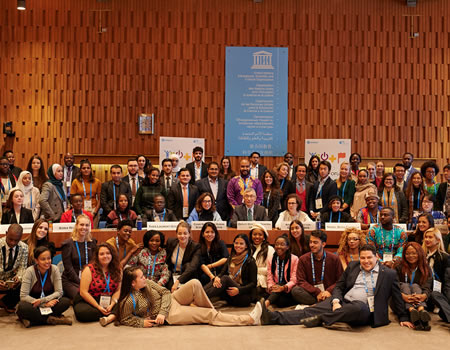
Photo: A Group Photograph of the participants in the Youth Forum at the UNESCO Headquarters in Paris, France. 18 November 2019. Image provided by & copyright © UNESCO/Luc Valigny.
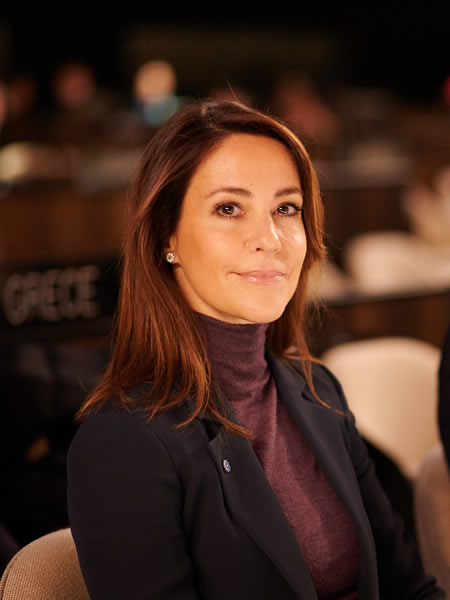
Photo: Princess Marie of Denmark on an official visit to the UNESCO Headquarters in Paris. November 15, 2019. Image provided by & copyright © UNESCO/Luc Valigny.
Paris, France, 19 November 2019 — UNESCO is hosting the Forum of Ministers of Culture, a major event to discuss the central place of culture in public policies around the world and its impact on sustainable development.
More than 140 Ministers and high representatives were present to mark a high point during the 40th session of the General Conference of UNESCO (12-27 November 2019). UNESCO, the only United Nations agency for culture, is returning to the tradition of ministerial meetings in the field of culture, 21 years after the Intergovernmental Conference on Cultural Policies for Development held in Stockholm, Sweden in 1998.
As a platform for priority setting and public policy development, this ministerial meeting is an opportunity to make decisive progress on the role of culture in development.
The Forum would explore these four themes:
- Culture and heritage, renewable energy for dialogue and peace.
- The culture at the heart of education. A fundamental dimension for human development and innovation.
- Investing in learning and creativity for sustainable development and employment.
- Culture in the public space. A driving force for urban and social transformation.
In response to contemporary changes, UNESCO is strengthening its multidisciplinary scope and addressing the issue of sustainable development comprehensively by emphasizing the linkages between culture and social, economic, and environmental issues. In the Forum of Ministers of Culture, the ministers will share their views through interactive exchanges. They will present their cultural policy priorities and visions for the future.
|GlobalGiants.Com|
— The editor is actively, effectively contributing to the enhancement of UNESCO Creative Cities Network (Division of Creativity, Culture Sector, UNESCO) since 2014.
Culture is part what shapes our identity.
— UNESCO (@UNESCO) November 18, 2019
If we invest in culture and creativity, it can have a huge impact in achieving the #GlobalGoals.
Make sure to check out the #unescoGC Forum of Ministers of Culture tomorrow for innovative stories! 👇
ℹï¸https://t.co/u8RkWOZALe pic.twitter.com/tZlPN0Oow0







Edited & Posted by the Editor | 12:13 PM | View the original post
November 16, 2019
India's HRD Minister addresses education ministers and representatives of nearly 190 countries at the 40th UNESCO General Conference in Paris.
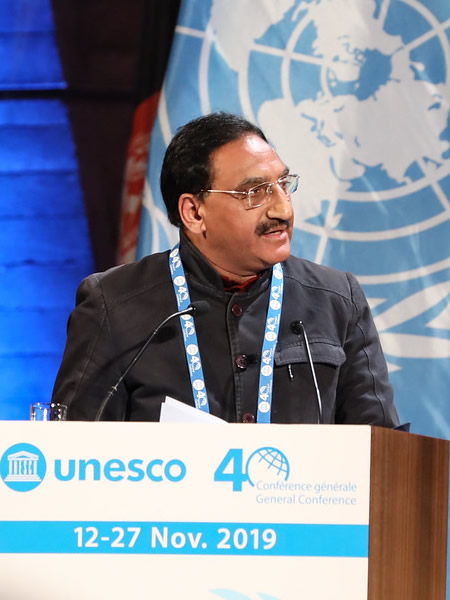
Photo: India’s HRD Minister, Ramesh Pokhriyal ‘Nishank’, addresses education ministers and representatives of nearly 190 countries at the 40th UNESCO General Conference in Paris. November 15, 2019. Image provided by & copyright © UNESCO/Marie Etchegoyen.
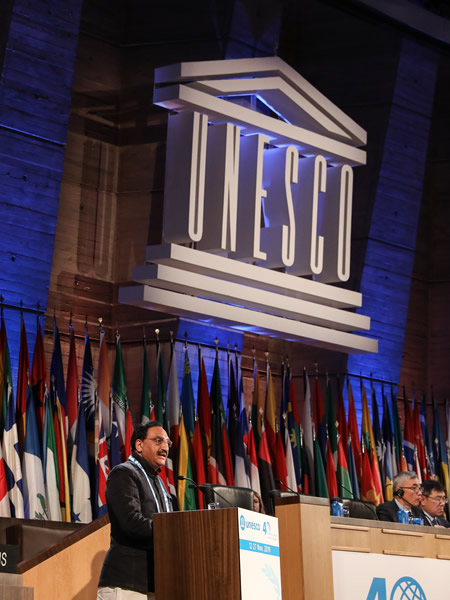
Photo: Dr. Ramesh Pokhriyal ‘Nishank’, Human Resources Development Minister, India, addressed the General Policy Debate at UNESCO General Conference in Paris. November 15, 2019. Image provided by & copyright © UNESCO/Marie Etchegoyen.
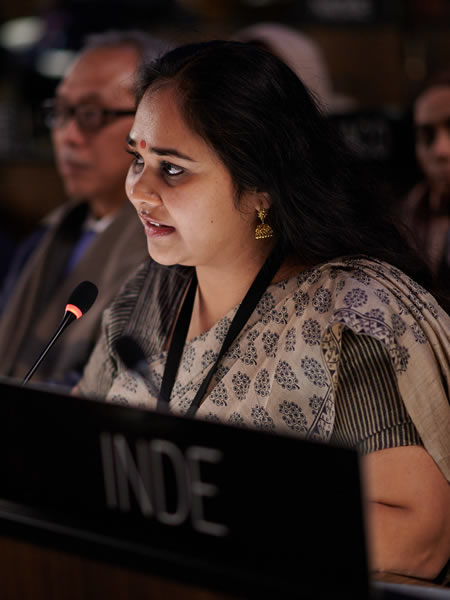
Photo: India’s representative, Ananya Agarwal, spoke forcefully during the General Policy Debate at the UNESCO General Conference in Paris. November 13, 2019. Image provided by & copyright © UNESCO/Luc Valigny.
New Delhi, November 15, 2019 — India’s Union HRD Minister, Ramesh Pokhriyal ”Nishank’, addressed education ministers/representatives of nearly 190 countries at the 40th UNESCO General Conference today in Paris.
He said that age-old immortal Indian culture had considered the whole world as a family. Spreading the great idea of ​​”Vasudhaiva Kutumbakam” all over the world, India has prayed for the welfare of the entire humanity by accepting the hypothesis of “Sarve Bhavantu Sukhinah, Survey Santu Niramaya,” he added. By contemplating the idea of Integral Human Debate, we have pledged to reach out to the last person in the society.
The Minister said that this session of UNESCO has another significance as it is being held at a time when the whole world is celebrating the 150th birth anniversary of Mahatma Gandhi. His message of truth and non-violence is even more critical and relevant today. Through education, we are trying to pursue and spread the spirit of universal brotherhood, social harmony, friendliness, human values, and love to every citizen of India, he added.
Minister ‘Nishank’ said that India is the third-largest education system in the world; therefore, it needs to be committed to building a bright future of more than 33 crore students. There are more than 1000 universities and more than 45000 colleges in India. India has been playing a positive and constructive role to carry forward the UNESCO’s mission and realize our shared objectives.
He assured continuous support of India to UNESCO in its effort to pursue its core mandate of building peace through international cooperation in Education, Science, Environment, and Culture.
He appreciated the efforts of UNESCO to ensure that every child and citizen receive a quality education.
The HRD Minister conveyed his thanks to UNESCO for including the city of Jaipur in the World Heritage List. He also thanked UNESCO for including Kumbh Mela, the world’s largest human gathering, in the list of intangible heritage. Likewise, he also welcomed the selection of Mumbai and Hyderabad for inclusion in the UNESCO Creative Cities Network.
|GlobalGiants.Com|
— The editor is actively, effectively contributing to the enhancement of UNESCO Creative Cities Network (Division of Creativity, Culture Sector, UNESCO) since 2014.
Union HRD Minister, Shri @DrRPNishank addressed #education ministers/representatives of countries at @UNESCO's 40th session of the General Conference in Paris. #unescoGC #UNESCO
— Ministry of HRD (@HRDMinistry) November 15, 2019







Edited & Posted by the Editor | 4:07 AM | View the original post
November 15, 2019
UNESCO is creating Inclusive Global Campus; Ministers and University Leaders address Inclusion and Mobility in Higher Education.
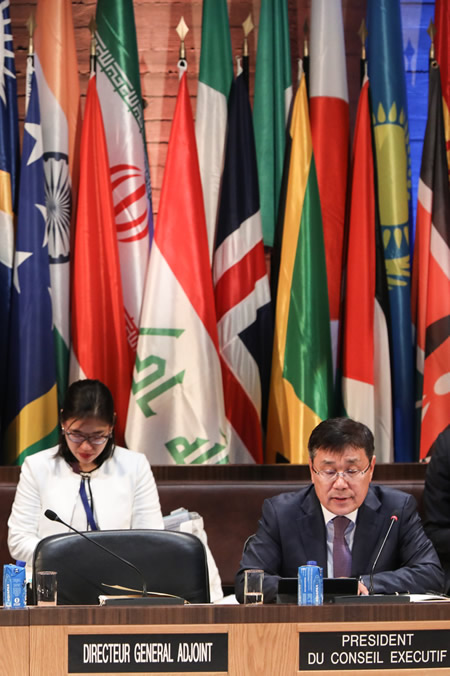
Photo: The Opening of the 40th General Conference of UNESCO. Image provided by & copyright © UNESCO/Marie Etchegoyen.
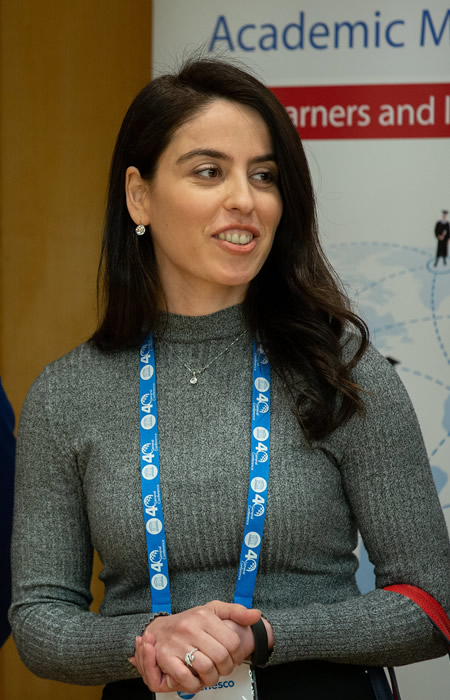
Photo: A Government Representative at the opening of the General Conference. Image provided by & copyright © UNESCO/Christelle ALIX.
Paris, France, November 14, 2019 — Over 100 ministers and 100 representatives from universities, participating in the UNESCO Chairs program convened during UNESCO’s General Conference currently taking place in Paris. They addressed some of today’s most pressing challenges in higher education: How can governments and higher education institutions work together to create a more inclusive global campus in the light of rapidly increasing numbers in enrolment and mobility of students? And how can the higher education sector across the world work against increasing inequalities and for the inclusion of marginalized groups into societies?
The higher education landscape is rapidly changing globally, characterized by increasing internationalization, diversification of providers, and new modes of learning. Two hundred twenty million students are today enrolled in higher education around the world, a number that has doubled over the past decade and is set to expand.
However, increased enrolments have not proven to be a reliable indicator for achieving the 2030 Agenda overall goal of “leaving no one behind,” or for ensuring equitable and affordable quality higher education. Institutions face the challenge of providing quality education to an increasingly diverse student population, including non-traditional learners and disadvantaged groups such as migrants, refugees, and indigenous peoples.
The past decades’ unprecedented increase of enrolment in higher education is also reflected in the mobility of students with the move from an international university to a global campus of learners, faculty, and researchers fast becoming a reality. In the decade leading up to 2011, the number of learners choosing to study outside of their home country more than doubled to 4.3 million students - a figure that is conservatively estimated to increase again by 2025.
Yet many students still face obstacles in having their qualifications recognized when returning to their home country or moving to a new country. Lack of recognition of qualifications constitutes a significant obstacle for accessing further studies or for seeking employment opportunities. Today more than half of students going abroad study outside their home regions.
To respond to this new reality, UNESCO is preparing the adoption of a Global Convention on the Recognition of Qualifications concerning Higher Education at its General Conference that started this week. The new Convention aims to facilitate student mobility and improve access to higher education across regions and continents. UNESCO has also launched a Qualifications Passport to facilitate the movement for refugees with qualifications.
By convening policymakers and universities at this unprecedented meeting, UNESCO aims to strengthen the political will, international cooperation, and capacities in higher education to achieve the 2030 Agenda and to create an understanding of how the Global Convention can facilitate this process.
|GlobalGiants.Com|
Wednesday at #unescoGC: Over 100 ministers of #HigherEducation will gather to make #education more accessible, mobile and meaningful for all
— UNESCO (@UNESCO) November 13, 2019
📚https://t.co/m5vQe95VM6 #IChoosePeace pic.twitter.com/Aj7IWubYGZ
Through art we build peace.
— UNESCO (@UNESCO) November 15, 2019
At #unescoGC, @ArtolutionOrg created a mural for peace & unity together w/ refugees from across the world. @UNESCO Director-General @AAzoulay contributed to the artwork herself, underlining our continuous efforts for a more peacefulðŸŒ. #IChoosePeace pic.twitter.com/drPFkqrizR







Edited & Posted by the Editor | 12:23 AM | View the original post
November 13, 2019
UN Secretary-General highlights UNESCO’s Global Leadership in Education at the Organization’s 40th General Conference.
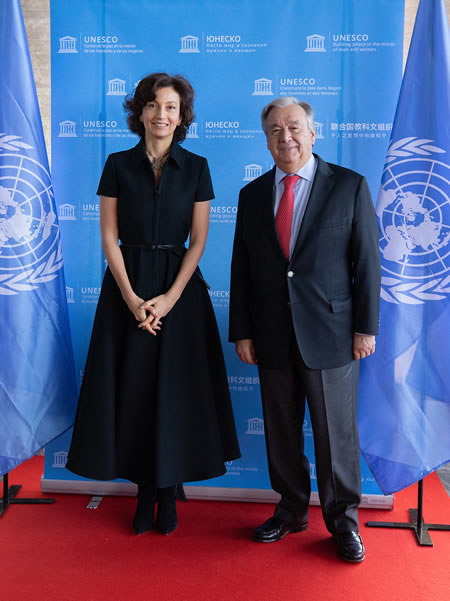
Photo: Secretary-General of the United Nations, Antonio Guterres, and UNESCO Director-General, Audrey Azoulay at the Opening of the 40th General Conference of UNESCO. Image provided by & copyright © UNESCO/Christelle ALIX.
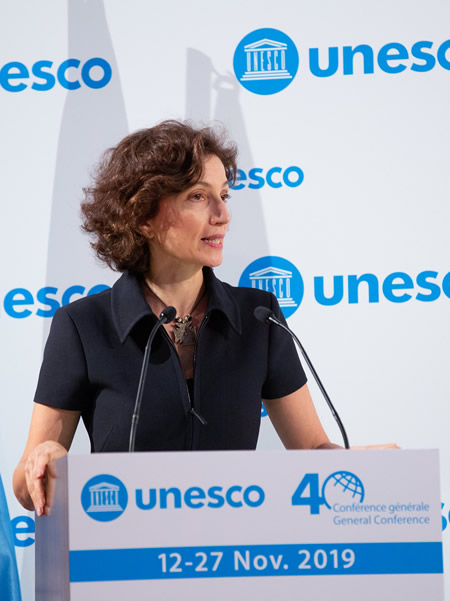
Photo: UNESCO Director-General, Audrey Azoulay addresses the Opening of the 40th General Conference of UNESCO. Image provided by & copyright © UNESCO/Christelle ALIX.
Paris, 12 November—The Secretary-General of the United Nations, Antonio Guterres, Tuesday morning stressed UNESCO’s essential mandate in education and pleaded in favor of multilateralism as he opened UNESCO’s 40th General Conference addressing representatives of the Organization’s 193 Member States and 11 Associate Members.
“Education is an essential pillar to achieve our objectives for 2030. And we are late,” said the Secretary-General. “UNESCO has a fundamental role to play to coordinate and monitor global efforts in this regard. I commend the initiative launched by the Director-General at the UN General Assembly last September on the futures of education.”
Warning against the splintering of the international community along economic, social, and environmental divides, growing hate and discrimination, the Secretary-General declared: “We must do everything to maintain a universal system based on international law and preserve a multipolar world with strong multilateral institutions.”
“A world of cracks and fault-lines is not sustainable,” said the Secretary-General. “In this context, UNESCO’s work is central to bringing the world together.”
After the Secretary-General’s opening, the Member States named Ambassador Ahmet Altay Cengizer, Permanent Delegate of Turkey to UNESCO, as President of the 40th session of the General Conference.
Organization’s Director-General, Audrey Azoulay, denounced the multiple divides that are eroding national and international governance as well as the planet itself. She highlighted UNESCO’s vocation to serve as a laboratory of ideas.
“Contemporary challenges call on us to draw on our shared humanity,” said Ms. Azoulay. “Territorial borders can not contain them. Only cooperation, solidarity, and multilateralism can result in lasting solutions.”
The Director-General denounced the crippling effect of divisiveness on international governance. She said that it is our responsibility “to be effective by making multilateralism an everyday reality and by providing evidence that it can lead to better lives.”
Ms. Azoulay also stressed the importance of education, “the keystone of peace. We must correct not only the insufficiencies and inequalities that education is suffering from but also improve our guidance to the world’s educational systems so that we may lay the best foundations of practical, real, sustainable development.”
The General Conference is the governing body of UNESCO. It meets every other year to determine the Organization’s program and budget.
During its 40th session, which ends on 27 November, Member States are also set to adopt an international convention destined to facilitate the international recognition of higher education diplomas and the free movement of students and faculty.
|GlobalGiants.Com|
Education is everyone’s responsibility!
— UNESCO (@UNESCO) November 13, 2019
It's on all of us to join forces and step up efforts to invest more in quality #education. 📚âœï¸
👉 https://t.co/2N8uexhQRA #SDG4 #GlobalGoals pic.twitter.com/xWwHcgBBLC







Edited & Posted by the Editor | 6:20 AM | View the original post
November 10, 2019
UNESCO General Conference to examine the draft of the Global Convention on the Recognition of Higher Education Qualifications.
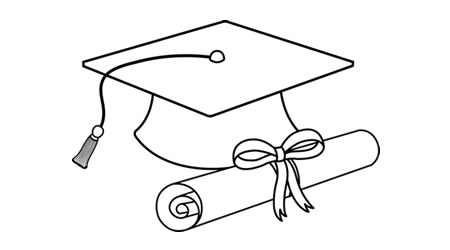
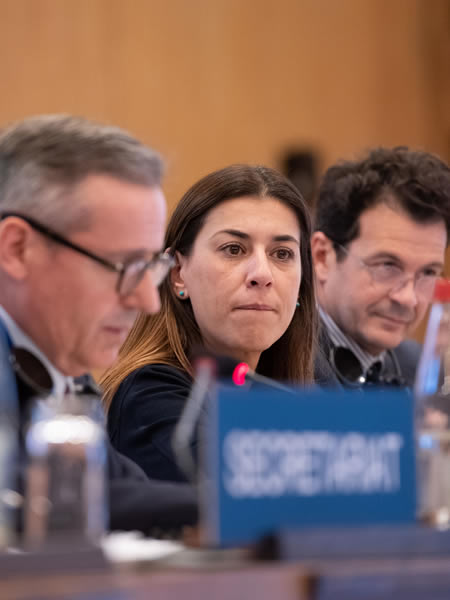
Photo: UNESCO Headquarters, Paris, France. Session of the Executive Board. October 16-17, 2019. Image Credit: UNESCO/C. Bailleul.
Paris, France, November 9, 2019 — In November 2019, UNESCO’s General Conference will examine for adoption the draft text of the Global Convention on the Recognition of Higher Education Qualifications. Once approved, the Global Convention will be the first legally binding United Nations treaty on higher education.
The Global Convention, a binding agreement, will join the ranks of other UNESCO conventions, such as the cultural conventions and the Convention against doping in sport.
The Convention will be the first of its kind in the UN on higher education with a global scope. It will complement the five UNESCO regional conventions on the recognition of higher education qualifications.
Built on the existing regional conventions, the Global Convention will create a framework for fair, transparent, and non-discriminatory recognition of higher education qualifications. The originality of the Convention is that it opens for inter-regional academic mobility, and puts into place universal principles for improving recognition practices.
Under certain conditions, the Convention will be open for countries, which wish to be committed to its text.
Today, more than 4 million students study outside their home country. By 2020 around 8 million students will be studying abroad. The Global Convention on Higher Education Qualifications is designed to facilitate academic mobility between regions. It will mainly benefit people who are seeking recognition of their qualifications in another area than their home region for either accessing higher education or continuing their studies.
For example, it will become easier for a student to have his/her high school diplomas recognized in another region to pursue his/her studies there. It will also facilitate a student who wants to complete a degree in another country based on education that he/she had started elsewhere.
The Global Convention on Higher Education Qualifications will also provide platforms for national authorities to collaborate across borders and regions to develop better tools and practices for the recognition of higher education qualifications.
UNESCO serves as a global platform for discussion on the recognition of higher education qualifications and the promotion of academic mobility. Being the only UN agency with a mandate in higher education, the new Convention is part of UNESCO’s technical support to review more top education strategies and policies in countries that decided to be committed to its text. This support aims to improve equitable access to quality higher education and enhance mobility and accountability.
UNESCO will be the secretariat of the mechanism to be set to ensure and monitor the implementation of the Convention’s text. This implementation mechanism body will meet every two years. It will provide guidance (recommendations, guidelines, and share good practices) to the countries committed to the Convention.
The Global Convention on Higher Education Qualifications will be a reliable instrument to prevent brain drain since it would facilitate governments to put in place mechanisms for recognizing degrees obtained abroad.
The Convention will also help migrants to access higher education in their new home countries as it obliges to put in place mechanisms to facilitate the recognition of refugees’ qualifications, even for those who cannot provide any documentary evidence of their skills.
The idea of a Global Convention on Higher Education Qualifications has been on UNESCO’s agenda for a long time. The formal process started in 2011 after a feasibility study had underlined the urgent need for such a convention to respond to the need for improved recognition of foreign qualifications worldwide. For this purpose, UNESCO established a drafting committee in 2016 consisting of experts from all regions that finalized a preliminary draft in June 2017.
UNESCO presented the draft for discussion at two intergovernmental meetings that took place in December 2018 and March 2019.
At the March meeting, more than 260 technical and legal experts from around 150 Member States approved the plan. Now the draft will be submitted for adoption at the 40th Session of the UNESCO General Conference in November 2019.
|GlobalGiants.Com|
Dear students,
— UNESCO (@UNESCO) November 25, 2019
🚨HISTORY WAS MADE TODAY🚨
The first ever Global Convention on #HigherEducation was adopted at #unescoGC! This will create a system of recognition of higher education qualifications on a global scale, the first of its kind.
📚https://t.co/5rOtm71MR9 pic.twitter.com/s4yizOisEz







Edited & Posted by the Editor | 3:58 AM | View the original post
November 6, 2019
UN Secretary-General Meets Comptroller and Auditor General of India, a Member of the UN Board of Auditors.
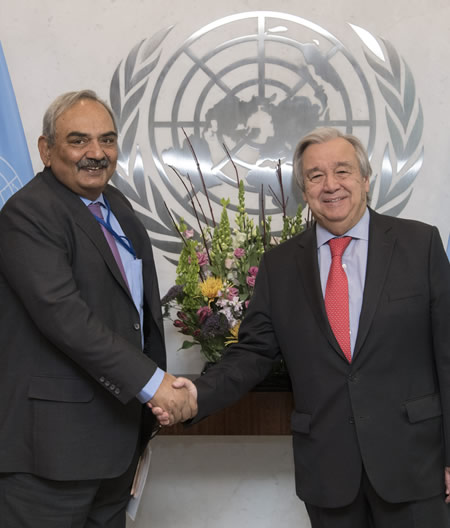
Photo: UN Secretary-General, António Guterres (right), meets with Rajiv Mehrishi, Comptroller and Auditor General of India. Mr. Mehrishi is a Member of the United Nations Board of Auditors. 05 November 2019. United Nations, New York. UN Photo/Mark Garten.
• UN Secretary-General Commemorates Fall of Berlin Wall.
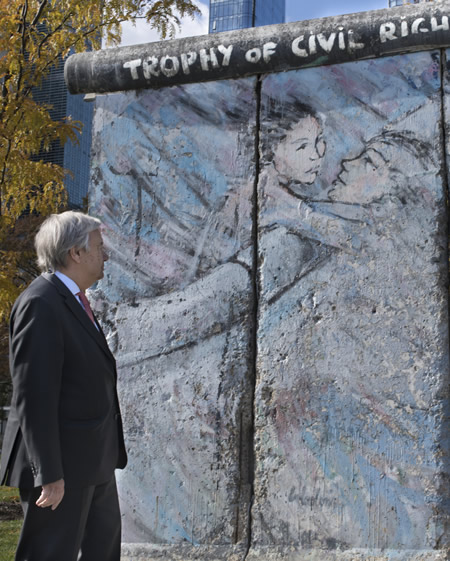
Photo: UN Secretary-General, António Guterres, stands by a piece of the Berlin Wall that stands in the garden of the UN Headquarters, ahead of the anniversary of the fall of the wall on 9 November 1989. The piece of wall was presented as a gift to the UN in 2002 by the Federal Republic of Germany. 08 November 2019. United Nations, New York. UN Photo/Mark Garten.
|GlobalGiants.Com|







Edited & Posted by the Editor | 8:31 AM | View the original post
November 1, 2019
Mumbai and Hyderabad join the 'UNESCO Creative Cities Network'
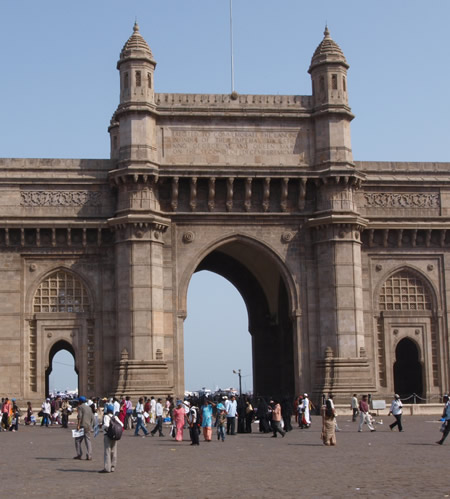
Photo: Gateway of India, Mumbai. Image Credit: Edgar Vonk. UNESCO has designated Mumbai as a Creative City of Film.
On the World Cities Day 2019, celebrated on 31 October, UNESCO announced that the cities of Mumbai and Hyderabad are joining the UNESCO network of Creative Cities. UNESCO has designated Mumbai, a Creative City of Film. While it has appointed Hyderabad, a Creative City of Gastronomy. In India, they join Chennai and Varanasi, UNESCO Cities of Music, and Jaipur, UNESCO City of Crafts and Folk Arts.
There are now 246 cities worldwide committing with UNESCO to place culture and creativity at the center of their development strategies and to share their best practices. “All over the world, these cities, each in its way, make culture the pillar, not an accessory, of their strategy,” said UNESCO Director-General Audrey Azoulay.
By joining the UNESCO Creative Cities Network (UCCN), cities commit to sharing their best practices and developing partnerships involving the public and private sectors as well as civil society to strengthen the creation, production, distribution, and dissemination of cultural activities, goods, and services. They also pledge to develop hubs of creativity and innovation and broaden opportunities for creators and professionals in the cultural sector.
The Network covers seven creative fields: Crafts and Folk Arts, Media Arts, Film, Design, Gastronomy, Literature, and Music.
UNESCO New Delhi Director Eric Falt offered words of praise to all those who worked on the candidacy of Mumbai and Hyderabad. He said: “I would like to offer my warm congratulations to both cities. I hope this will strengthen the development of hubs of creativity and innovation, which will contribute to the sustainable development plans of Mumbai and Hyderabad.”
This 30 October 2019, 66 cities have been designated as UNESCO Creative Cities by the Director-General of UNESCO, Audrey Azoulay. As laboratories of ideas and innovative practices, the UNESCO Creative Cities bring a tangible contribution to achieving the Sustainable Development Goals through innovative thinking and action. Through their commitment, cities are championing sustainable development actions that directly benefit communities at the municipal level.
The new 66 UNESCO Creative Cities are:
- Afyonkarahisar (Turkey) - Gastronomy
- Ambon (Indonesia) - Music
- Angoulême (France) - Literature
- Areguá (Paraguay) - Crafts and Folk Art
- Arequipa (Peru) - Gastronomy
- Asahikawa (Japan) - Design
- Ayacucho (Peru) - Crafts and Folk Art
- Baku (Azerbaijan) - Design
- Ballarat (Australia) - Crafts and Folk Art
- Bandar Abbas (Iran [the Islamic Republic of]) - Crafts and Folk Art
- Bangkok (Thailand) - Design
- Beirut (Lebanon) - Literature
- Belo Horizonte (Brazil) - Gastronomy
- Bendigo (Australia) - Gastronomy
- Bergamo (Italy) - Gastronomy
- Biella (Italy) - Crafts and Folk Art
- Caldas da Rainha (Portugal) - Crafts and Folk Art
- Cebu City (Philippines) - Design
- Essaouira (Morocco) - Music
- Exeter (United Kingdom of Great Britain and Northern Ireland) - Literature
- Fortaleza (Brazil) - Design
- Hanoi (Vietnam) - Design
- Havana (Cuba) - Music
- Hyderabad (India) - Gastronomy
- Jinju (Republic of Korea) - Crafts and Folk Art
- Kargopol (Russian Federation) - Crafts and Folk Art
- Karlsruhe (Germany) - Media Arts
- Kazan (Russian Federation) - Music
- Kırşehir (Turkey) - Music
- Kuhmo (Finland) - Literature
- Lahore (Pakistan) - Literature
- Leeuwarden (Netherlands) - Literature
- Leiria (Portugal) - Music
- Lliria (Spain) - Music
- Mérida (Mexico) - Gastronomy
- Metz (France) - Music
- Muharraq (Bahrain) - Design
- Mumbai (India) - Film
- Nanjing (China) - Literature
- Odesa (Ukraine) - Literature
- Overstrand Hermanus (South Africa) - Gastronomy
- Port of Spain (Trinidad and Tobago) - Music
- Portoviejo (Ecuador) - Gastronomy
- Potsdam (Germany) - Film
- Querétaro (Mexico) - Design
- Ramallah (Palestine) - Music
- San José (Costa Rica) - Design
- Sanandaj (Iran [the Islamic Republic of]) - Music
- Santiago de Cali (Colombia) - Media Arts
- Santo Domingo (Dominican Republic) - Music
- Sarajevo (Bosnia and Herzegovina) - Film
- Sharjah (United Arab Emirates) - Crafts and Folk Art
- Slemani (Iraq) - Literature
- Sukhothai (Thailand) - Crafts and Folk Art
- Trinidad (Cuba) - Crafts and Folk Art
- Valladolid (Spain) - Film
- Valledupar (Colombia) - Music
- ValparaÃso (Chile) - Music
- Veszprém (Hungary) - Music
- Viborg (Denmark) - Media Arts
- Viljandi (Estonia) - Crafts and Folk Art
- Vranje (Serbia) - Music
- Wellington (New Zealand) - Film
- Wonju (Republic of Korea) - Literature
- Wrocław (Poland) - Literature
- Yangzhou (China) - Gastronomy
The UNESCO Creative Cities Network now counts a total of 246 cities.
The member cities that form part of the Network come from all continents and regions with different income levels and populations. They work together towards a joint mission: placing creativity and the creative economy at the core of their urban development plans to make cities safe, resilient, inclusive, and sustainable, in line with the United Nations 2030 Agenda for Sustainable Development.
|GlobalGiants.Com|
— The editor is actively, effectively contributing to the enhancement of UNESCO Creative Cities Network (Division of Creativity, Culture Sector, UNESCO) since 2014.
The UNESCO announced that the city of #Mumbai has been designated as a 'Creative city of film' . In India, Mumbai joins Chennai & Varanasi, @UNESCO Cities of music, & Jaipur, UNESCO City of crafts and folk arts. Congratulations to Mumbaikars & all members of the film fraternity . pic.twitter.com/ExnwTNI7G1
— Ministry of Culture (@MinOfCultureGoI) November 1, 2019







Edited & Posted by the Editor | 10:34 AM | View the original post
October 17, 2019
UN proclaims International Day for Universal Access to Information.
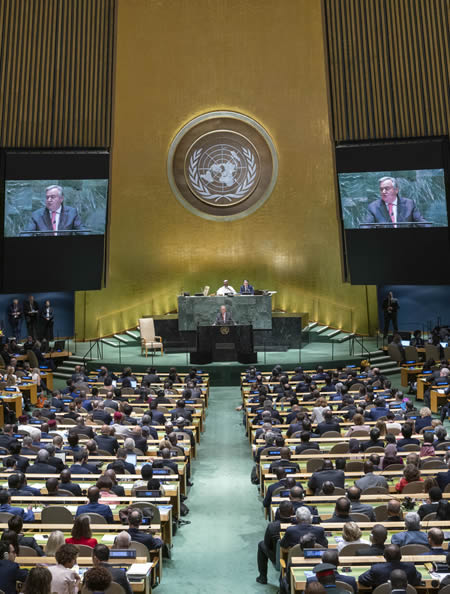
Photo: UN Secretary-General António Guterres (on screens and at podium) addresses the opening of the general debate of the seventy-fourth session of the General Assembly. 24 September 2019. United Nations, New York. UN Photo/Cia Pak. [File Photo]
United Nations, 17 October 2019 — The 74th UN General Assembly (UNGA) has proclaimed 28 September as the International Day for Universal Access to Information.
The resolution was adopted by consensus following a presentation by the Permanent Representative of the Republic of Liberia to the United Nations, Ambassador Dee-Maxwell Saah Kemayah, who led the proposal and negotiations for the resolution.
The resolution was put forward by six UN Member States as chief co-sponsors, alongside Liberia were: Argentina, Canada, Costa Rica, Sierra Leone, and Ukraine. Another 23 countries joined in co-sponsoring the resolution upon its adoption.
“Public access to information can enhance the protection of human rights, bring about better governance, fight corruption, and drive sustainable development,” underscored Moez Chakchouk. Moez Chakchouk is Assistant-Director General for Communication and Information for UNESCO. He was speaking during the opening of the international Open Talks global commemoration event held in Lima, Peru, on 27 September 2019.
As part of its role in the protection of the right to seek and receive information, UNESCO has been designated by the UN General Assembly as the custodian agency for global monitoring of SDG target 16.10.2.
SDG 16.10.2 tracks progress on the achievement of SDG 16 in terms of improvements in countries adopting and implementing constitutional, statutory, and policy guarantees to the public access to information. UNESCO monitoring of 42 countries during 2019 showed a need for improved record-keeping on the implementation at the national level.
Together with civil society efforts, UNESCO is now encouraging and supporting the Member States to include the 16.10.2 indicator in their monitoring of SDG progress.
|GlobalGiants.Com|







Edited & Posted by the Editor | 12:05 PM | View the original post
October 16, 2019
World Intellectual Property Filings for Patents, Trademarks, Industrial Designs reach Record Heights; China, India register Impressive Increases.
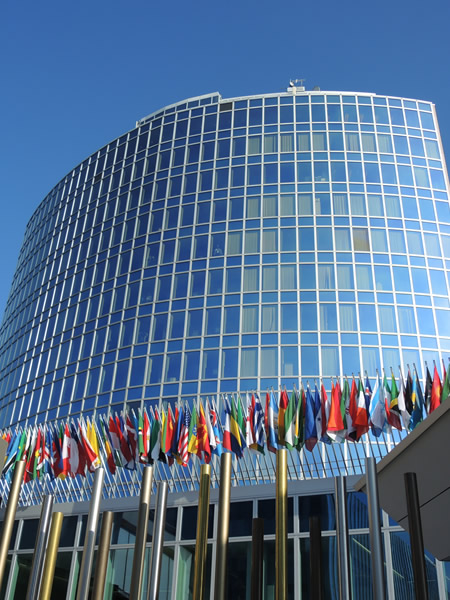
Photo: World Intellectual Property Organization (WIPO) Headquarters, Geneva, Switzerland.
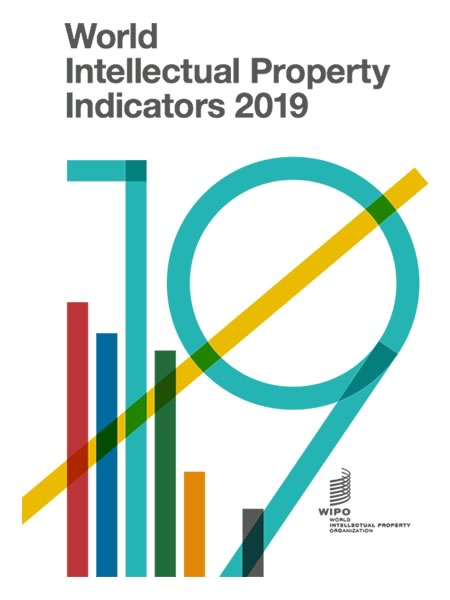
Geneva, October 16, 2019 — Asia accounted for more than two-thirds of all patent, trademark and industrial design applications in 2018, with China driving overall growth in demand for intellectual property (IP) rights. The United States of America (US) maintained its supremacy in patent applications filed in export markets.
Innovators across the globe filed 3.3 million patent applications in 2018, up 5.2% for a ninth straight yearly increase, according to WIPO’s annual World Intellectual Property Indicators (WIPI) report. Global trademark filing activity rose to 14.3 million, while that for industrial designs reached 1.3 million.
“Asia continues to outpace other regions in filing activity for patents, trademarks, industrial designs, and other intellectual property rights. And these intellectual property rights are at the center of the global economy,” said WIPO Director General, Francis Gurry. “China alone accounted for almost half of all the world’s patent filings, with India also registering impressive increases. Asia has become a global hub for innovation.”
Worldwide ‘Plant Variety’ applications grew by 8.9% to reach 20,210 applications in 2018, while data received from 92 national and regional authorities showed some 65,900 protected geographical indications (GIs) in 2018.
• Patents
China’s IP office received the highest number of patent applications in 2018. A record of 1.54 million applications that amounts to 46.4% of the global total. IP offices of the US (597,141), Japan (313,567), the Republic of Korea (209,992), and the European Patent Office (174,397) followed China’s IP office. Together, these five offices accounted for 85.3% of the world’s total.
Among the top five offices, China (+11.6%), the EPO (+4.7%), and the Republic of Korea (+2.5%) recorded growth in applications, while both Japan (-1.5%) and the US (-1.6%) saw small declines. For the US, it was the first decline in applications since 2009.
Germany (67,898), India (50,055), the Russian Federation (37,957), Canada (36,161) and Australia (29,957) also featured among the top 10 offices. All of these offices saw growth in filings, ranging from 7.5% in India to 0.3% in Germany.
• Asia is the hub of global patent filings.
Asia has strengthened its position as the region with the most significant activity in patent filings. Offices located in Asia received two-thirds (66.8%) of all applications filed worldwide in 2018 - a considerable increase from 50.8% in 2008 - primarily driven by growth in China. Offices located in North America accounted for just under one-fifth (19%) of the 2018 world total, while those in Europe accounted for only over one-tenth (10.9%). The combined share of offices located in Africa, Latin America, the Caribbean, and Oceania was 3.3% in 2018.
US applicants filed the most significant number of patent applications beyond its borders.
In terms of filing abroad, which is an indication of a desire to expand in new markets, US residents continue to lead with 230,085 equivalent patent applications filed elsewhere in 2018. Japan (206,739), Germany (106,753), the Republic of Korea (69,459), and China (66,429) followed the US.
• Trademarks
An estimated 10.9 million trademark applications covering 14.3 million classes were filed worldwide in 2018. The number of types specified in forms grew by 15.5% in 2018, marking a ninth consecutive year of growth.
China’s IP office had the highest volume of filing activity with a class count of around 7.4 million; followed by the IP offices of the US (640,181) and Japan (512,156); the European Union Intellectual Property Office (EUIPO; 392,925) and the IP office of the Islamic Republic of Iran (384,338).
Among the top 20 offices, the most substantial increases between 2017 and 2018 were in the IP offices of Indonesia (+29.1%), China (+28.3%), India (+20.9%), the Republic of Korea (+14.5%) and the United Kingdom (+12.4%).
• Asia leads in trademark filings.
Offices located in Asia accounted for 70% of all trademark filing activity in 2018, up from 36.2% in 2008. Europe’s share declined from 38.4% in 2008 to 15.8% in 2018. North America accounted for 5.8% of the world total in 2018, while the combined share of offices located in Africa, Latin America, the Caribbean, and Oceania was 8.4% in 2018.
There were an estimated 49.3 million active trademark registrations worldwide in 2018 - up 13.8% in 2017, with 19.6 million in China alone, followed by 2.4 million in the US, and 1.9 million in India.
• Industrial designs
An estimated 1 million industrial design applications containing 1.3 million designs were filed worldwide in 2018, representing a 5.7% year-on-year increase. China’s IP office received applications containing 708,799 designs in 2018, corresponding to 54% of the world total. EUIPO (108,174), and the IP offices of the Republic of Korea (68,054), the US (47,137), and Germany (44,460) followed China.
Among the top 20 offices, the following five offices reported double-digit growth in design counts: the UK (+42.4%), the Russian Federation (+21%), Italy (+16.6%), India (+13.6%) and China (+12.7%).
• Asia sees the highest design activity.
Offices located in Asia accounted for more than two-thirds (69.7%) of all designs in applications filed worldwide in 2018, followed by Europe (23%) and North America (4.1%). The combined share of Africa, Latin America, the Caribbean, and Oceania was 3.2% in 2018.
Designs related to furnishings accounted for 10.5% of global filing activity, followed by those related to clothing (8.3%) and packages and containers (7.7%).
• Plant varieties
China’s relevant office received 5,760 plant variety applications in 2018, up 29% from 2017. It now accounts for over a quarter of the plant variety applications filed worldwide. The Community Plant Variety Office of the European Union (CPVO; 3,554), and relevant offices of the US (1,609), Ukraine (1,575), and Japan (880) followed China. Among the top five offices, China and Ukraine (+17.1%) saw double-digit growth in filings 2018; CPVO (+3.9%) and the US (+3.3%) reported similar growth rates. Japan (-13.6%) saw a sharp drop in filings.
• Geographical indications
In 2018, there were around 65,900 GIs in force worldwide. GIs are signs used on products that have a specific geographical origin and possess qualities or a reputation that are due to that origin. Germany (15,566) reported the most significant number of GIs in force, followed by China (7,247), Hungary (6,683), and the Czech Republic (6,285).
GIs in force relating to “wines and spirits” accounted for around 51.1% of the 2018 world total, followed by agricultural products and foodstuffs (29.9%) and handicrafts (2.7%).
• Publishing industry
Revenue generated by the trade and the educational sectors of the publishing industry of 14 countries amounted to USD 42.5 billion. The US (USD 23.3 billion) reported the most substantial net revenue, followed by Germany (USD 6.1 billion), the UK (USD 5.4 billion), and France (USD 3 billion).
Online sales channels generated more than half of all trade sector revenue in the UK (51.5%). The US (41.6%), Brazil (25.5%), and Sweden (23.5%) also saw large proportions of their total trade sector revenue generated by online sales channels. However, brick and mortar outlets continue to produce the highest share of total trade sector revenue for all the reported countries, except in Slovenia, the UK, and the US.
The US sold 2.6 billion copies of published titles covering the trade and educational sectors in 2018. The UK (652 million), France (419 million), and Turkey (400 million) followed the US.
The World Intellectual Property Organization (WIPO) is the global forum for intellectual property policy, services, information, and cooperation. A specialized agency of the United Nations, WIPO assists its 192 member states in developing a balanced international IP legal framework to meet society’s evolving needs. It provides business services for obtaining IP rights in multiple countries and resolving disputes. It delivers capacity-building programs to help developing countries benefit from using IP. And it offers free access to unique knowledge banks of IP information.
|GlobalGiants.Com|
— The editor is an alumnus of the WIPO Academy.







Edited & Posted by the Editor | 12:39 PM | View the original post
October 14, 2019
UNESCO announces Winners of the 2019 Asia-Pacific Awards for Cultural Heritage Conservation

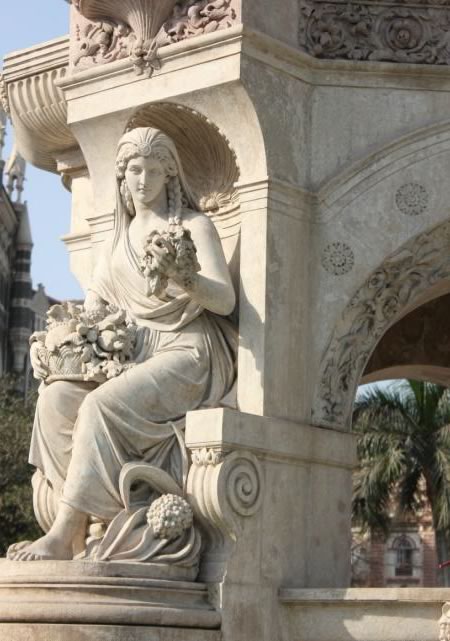
Photos: Flora Fountain, Mumbai, India. Flora Fountain has received ‘Honorable Mention’ at the 2019 UNESCO Asia-Pacific Awards for Cultural Heritage Conservation.
PENANG, MALAYSIA, 14 October 2019 - The renewal of the historic Tai Kwun - Centre for Heritage and Arts, Hong Kong, has received the Award of Excellence in this year’s UNESCO Asia-Pacific Awards for Cultural Heritage Conservation.
Sixteen projects from five countries - Australia, Bhutan, China, India, and New Zealand - have been recognized by the international Jury of conservation experts in this year’s awards. The Jury met in August to review 57 entries from 14 countries across the Asia-Pacific region.
The Jury praised the Award of Excellence winner, Tai Kwun - Centre for Heritage and Arts, stating:
“The transformation of the former Central Police Station into a world-class center for heritage and arts has created a vibrant new civic space in the heart of the city’s central business district.”
Other Awardees include:
Award of Distinction
- Keyuan Garden, Suzhou, China
- Vikram Sarabhai Library, Indian Institute of Management, Ahmedabad, India
- Nelson School of Music, Nelson, New Zealand
Award of Merit
- Tseto Goenpa, Paro, Bhutan
- Guyue Bridge, Chi’an Town, Zhejiang, China
- Keneseth Eliyahoo Synagogue, Mumbai, India
- Our Lady of Glory Church, Mumbai, India
- Lyttelton Timeball Station, Christchurch, New Zealand
Honorable Mention
- The 5s Classroom, Preshil The Margaret Lyttle Memorial School, Kew, Australia
- Westpac Long Gallery, Australian Museum, Sydney, Australia
- Liddell Bros. Packing Plant, Wuhan, China
- Flora Fountain, Mumbai, India
New Design in Heritage Contexts
- Joan Sutherland Theatre Passageway and Lift, Sydney Opera House, Sydney, Australia
- Dry Pit Latrine in Jiaxian Ancient Jujube Garden, Nihegou Village, Shaanxi, China
- The Mills, Hong Kong SAR, China
The UNESCO Asia-Pacific Awards for Cultural Heritage Conservation program recognizes private individuals and organizations for successfully restoring and conserving structures and buildings of heritage value in the region. By recognizing private efforts to restore and adapt historic properties, the Awards aim to encourage other property owners to undertake conservation projects within their communities, either independently or by seeking public-private partnerships.
Awarded projects reflect a clear understanding and application of various criteria, such as the articulation of the spirit of place, technical achievement, appropriate use or adaption, and the project’s contribution to the surrounding environment as well as the local community’s cultural and historical continuity.
The 2019 Awards Ceremony saw 150 past winners, jury members, contributors, and friends of the Awards gather to recognize this year’s Award Winners.
|GlobalGiants.Com|







Edited & Posted by the Editor | 2:25 PM | View the original post
October 10, 2019
Tbilisi, Georgia, named World Book Capital 2021
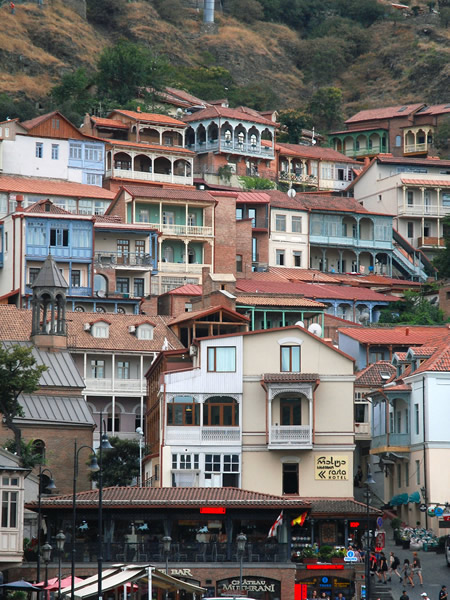
Photo: Tbilisi (Georgia) old town area. Image credit: Jelger.
Paris, France, 07 October 2019 — At the recommendation of the World Book Capital Advisory Committee, the Director-General of UNESCO, Audrey Azoulay, has named Tbilisi (Georgia) World Book Capital for the year 2021.
Around the slogan, “Ok. So your next book is…?” the program focuses on the use of modern technologies as powerful tools for promoting reading among the youth.
Several meaningful, large-scale, and sustainable activities comprise the program. Amongst the events and activities, there will be libraries and a book festival for children, a state-of-the-art digital project for transforming books into games, and the rebuilding of the first Georgian publishing house.
Specially designed for children, youngsters, and readers who have limited access to books, the activity program will be driven by innovation. The city’s principal objective is to popularize reading and increase accessibility to books for all social levels.
The year of celebrations will start on 23 April 2021, on the World Book and Copyright Day.
Cities designated as UNESCO World Book Capital undertake to promote books and reading and to organize activities over the year. As the twenty-first city to bear the title since 2001, Tbilisi follows Kuala Lumpur (2020) and Sharjah (2019). Past winners include Madrid (2001), Alexandria (2002), New Delhi (2003), Anvers (2004), Montreal (2005), Turin (2006), Bogota (2007), Amsterdam (2008), Beirut (2009), Ljubljana (2010), Buenos Aires (2011), Erevan (2012), Bangkok (2013), Port Harcourt (2014), Incheon (2015), Wroclaw (2016), Conakry (2017) and Athens (2018).
The Advisory Committee for nominating the World Book Capital city is made up of representatives of the International Publisher’s Association (IPA), the International Federation of Library Associations (IFLA), and UNESCO.
|GlobalGiants.Com|







Edited & Posted by the Editor | 12:44 PM | View the original post
October 5, 2019
UNESCO names Mexican Actress of Indigenous Origin, Yalitza Aparicio, as its Goodwill Ambassador
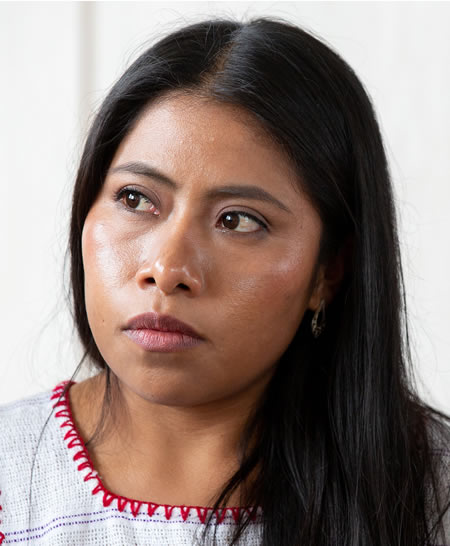
Photo: UNESCO Goodwill Ambassador Yalitza Aparicio. Image provided by & Copyright © UNESCO / Christelle ALIX.
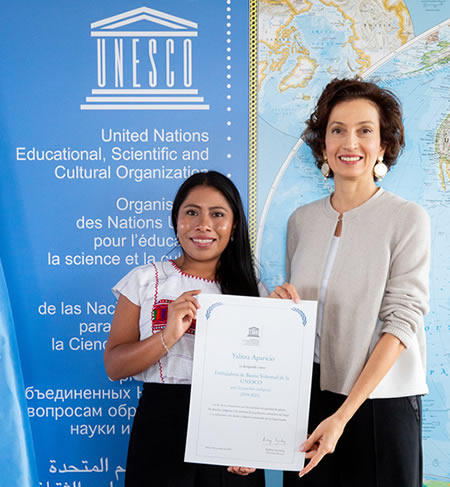
Photo: Presentation of the Certificate of Goodwill Ambassador to Yalitza Aparicio by the UNESCO Director-General Audrey Azoulay. Image provided by & Copyright © UNESCO / Christelle ALIX.
Paris France, 04 October 2019 — The Director-General of UNESCO, Audrey Azoulay, has named Mexican actress Yalitza Aparicio as a UNESCO Goodwill Ambassador for Indigenous Peoples.
Born in Tlaxiaco, in the Mexican state of Oaxaca, Ms. Aparicio is committed to the fight against racism and for the rights of women and indigenous peoples. She was chosen to play in Alfonso Cuarón’s film Roma while studying to be a teacher. Her performance in the movie, for which she had to learn the Mixtec language of her father’s family, won her an Oscar nomination for best actress. It made her the first indigenous Mexican woman to be so recognized by the US Academy Awards. TIME magazine (USA) listed her as one of the 100 most influential people in the world in 2019.
Ms. Aparicio is one of the faces of the 2019 International Day of the World’s Indigenous Peoples. She has lent her support to the United Nations campaign, “I say no to racism!”.
She has used her celebrity to promote respect and dignity. Ms. Aparicio has thus contributed to the work of the Mexican Commission for the Defense and Promotion of Human Rights. She also works for children’s education, helping raise funds for schools in the city of her birth.
Ms. Aparicio will contribute to UNESCO’s work to ensure the integration of indigenous peoples everywhere and the realization of their rights. She would be helping to safeguard indigenous cultural heritage, the inclusion of indigenous knowledge in environmental management, the preservation of biodiversity, adaptation to climate change, and equal access to education for indigenous peoples.
UNESCO Goodwill ambassadors are personalities who place their reputation at the service of the Organization’s campaigns. They commit to raising public awareness of the Organization’s mission for two years.
|GlobalGiants.Com|







Edited & Posted by the Editor | 12:51 PM | View the original post
September 23, 2019
A Green Roof and Solar Panels gifted by India installed on the Roof of the UN Headquarters in New York
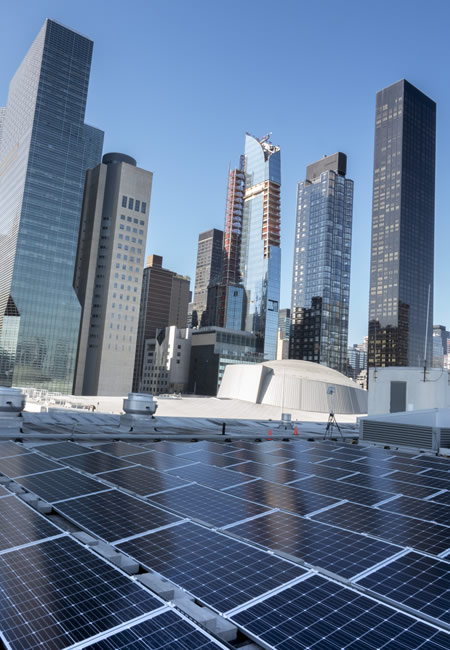
Photo: A view of the solar panels, a gift from India, installed on the roof of the United Nations. 21 September 2019. United Nations, New York. UN Photo/Cia Pa.
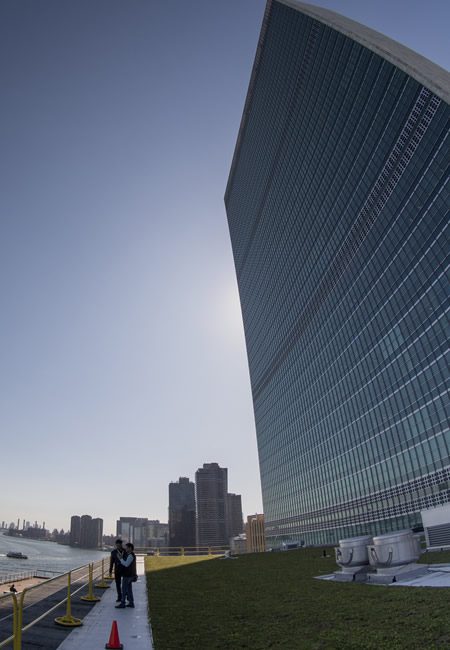
Photo: A view of the green roof placed next to the new solar panels, gifts from India, on the roof of the conference building at the United Nations headquarters. 21 September 2019. United Nations, New York. UN Photo/Cia Pak.
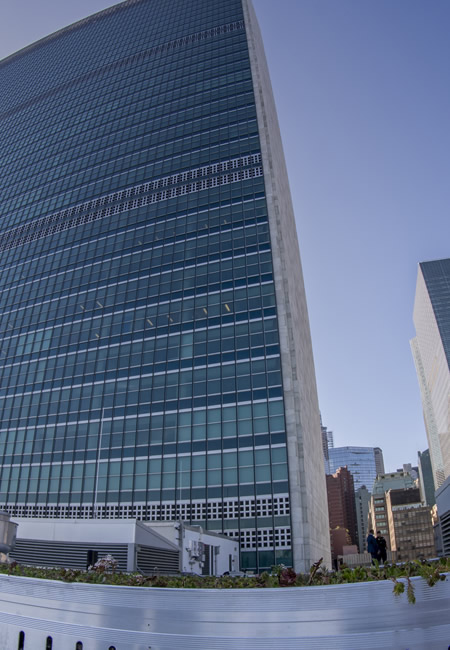
Photo: A view of the green roof placed next to the new solar panels, gifts from India, on the roof of the conference building at the United Nations headquarters. 21 September 2019. United Nations, New York. UN Photo/Cia Pak
|GlobalGiants.Com|
Watch as @dwaughray joins @IsabellaLovin, @PrakashJavdekar at a @UN press conference to announce the Leadership Group on #IndustryTransition, supported by @wef and @ETC_energy: https://t.co/CZ63QaOg8q #MissionPossible
— World Economic Forum (@wef) September 23, 2019







Edited & Posted by the Editor | 3:01 PM | View the original post
September 21, 2019
Observance of International Peace Day at the UN Headquarters
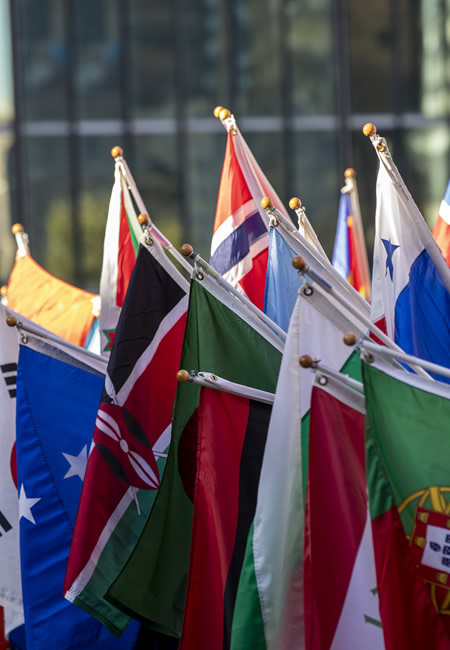
Photo: A view of flags held by students at the annual ceremony at the UN headquarters in observance of the International Day of Peace (21 September).
The theme of the International Day of Peace of 2019 is “Climate Action for Peace” to draw attention to the importance of combatting climate change as a way to protect and promote peace throughout the world. 20 September 2019. United Nations, New York. UN Photo/Laura Jarriel.
|GlobalGiants.Com|
People around the 🌎 are taking action for peace in different ways, including through #ClimateAction.
— United Nations (@UN) September 21, 2019
On Saturday's #PeaceDay, find out how you can contribute to a more peaceful world : https://t.co/eSz3GOyLKA pic.twitter.com/ihJN7QkVjL







Edited & Posted by the Editor | 10:50 AM | View the original post
September 10, 2019
A View of the United Nations Headquarters on 09 September 2019
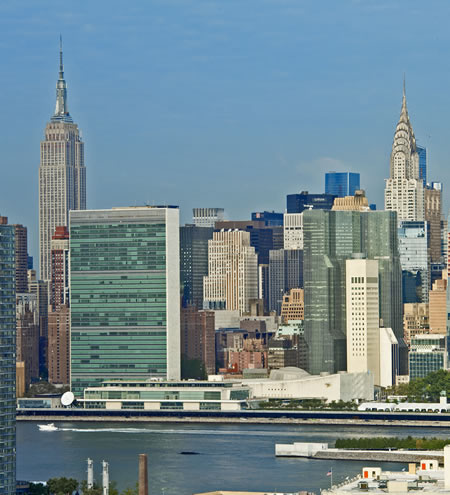
Photo: A view of United Nations Headquarters and parts of Manhattan as seen from Queens. 09 September 2019. United Nations, New York. UN Photo/Evan Schneider.
|GlobalGiants.Com|
Watch as history is made.
— United Nations (@UN) September 7, 2019
World leaders will converge on UNHQ in NYC to tackle major challenges facing humanity at the 74th session of the #UNGA. pic.twitter.com/9roqBD7RyZ







Edited & Posted by the Editor | 11:13 AM | View the original post
September 7, 2019
UNESCO Creative Cities Annual Conference: Santos, Brazil, will host it in 2020; Istanbul, Turkey, will host it in 2021.
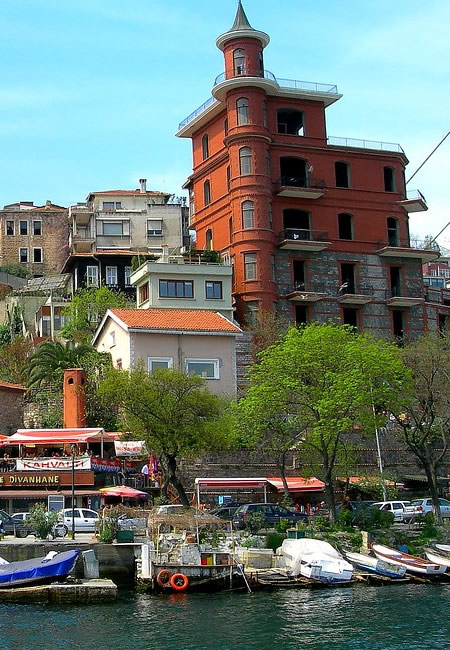
Photo: Istanbul, Turkey. Image Credit: Juan Antonio Segal. The city of Istanbul in Turkey is a UNESCO Creative City of Design.
Paris, France, 07 September 2019 — Istanbul has been selected as the Host City of the XV UNESCO Creative Cities Network’s Annual Conference in 2021 following an online vote by the 180 members of the UNESCO Creative Cities Network (UCCN) present in 72 countries.
Istanbul is a major city in Turkey that straddles Europe and Asia across the Bosphorus Strait. Istanbul’s Old City reflects the cultural influences of the many empires that once ruled here.
“Future Proof Cities” will be the theme of the 2021 conference. This theme refers to the concept of urban future-proofing. It involves monitoring developments in all areas of urban life to ensure an equilibrium between the environment, technology, economic activity, and human needs and aspirations.
The UCCN Annual Conferences bring together mayors, municipal decision-makers, and other stakeholders. They examine ways to place people at the center of sustainable urban development from the economic, environmental, social, and cultural perspectives. The UCCN conferences echo the overarching objective of the United Nations’ 2030 Agenda for Sustainable Development - Leaving no one behind.
Fabriano, Italy, hosted this year’s conference.
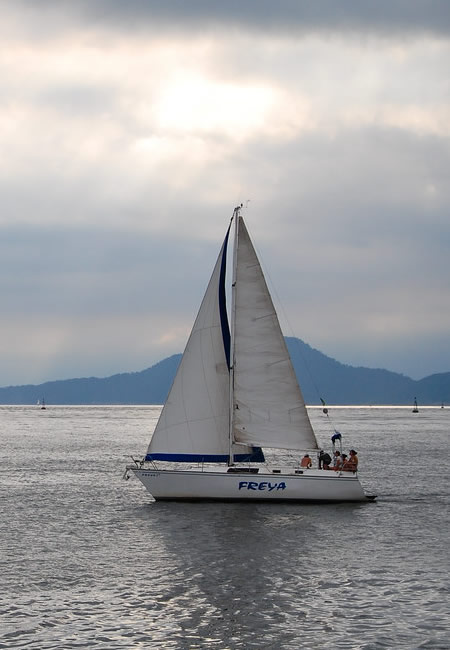
Photo: Santos, Brazil. Image Credit: Ricardo ATB. The city of Santos in Brazil is a UNESCO Creative City of Film.
The 2020 event will take place in the city of Santos in Brazil, a UNESCO Creative City of Film since 2015. Santos will be the first city of the Latin America and Caribbean Region to host the UCCN Annual Conference and the first Creative City of Film to do so. Under the theme “Creativity, Path to Equality,” the 2020 Annual Conference will demonstrate the power of creativity and culture in advancing sustainable development and reducing social and economic inequalities.
Krakow and Katowice, Poland hosted the Annual Conference in 2018, after Enghien-les-Bains, France (2017), and Östersund, Sweden (2016).
UNESCO established the Creative Cities Programme and Network to promote international cooperation between cities that are committed to investing in culture and creativity to stimulate and drive sustainable development. The Network covers seven creative fields: Crafts and Folk Art, Design, Film, Gastronomy, Literature, Media Arts and Music.
Cities in the Network anchor culture and creativity in their development frameworks and policies to advance objectives such as social cohesion, employment, entrepreneurship, and gender balance among others for the achievement of the 2030 Sustainable Development Goals. The annual conferences are a unique opportunity for cities to review their results, exchange best practices and ideas, and identify new trends. The cities discuss challenges and opportunities and build connections and partnerships.
Home to over half of the world’s population, the cities play a crucial role in developing and implementing strategies that address the development challenges of the 21st century. In this context, the UNESCO Creative Cities Programme and its Annual Conference have an ever more critical role to play in addressing the contemporary challenges and opportunities facing cities and human settlements.
Source: UNESCO, Paris.
|GlobalGiants.Com|
Good morning from #Istanbul Sunny and pleasantly warm today a high of 24°C & a low of 14°C. Have a great day! pic.twitter.com/vjyTsVGrcD
— Istanbul CVB (@istanbul_cvb) May 6, 2019







Edited & Posted by the Editor | 2:57 PM | View the original post
September 4, 2019
UN Secretary-General Appoints Melissa Fleming of United States Under-Secretary-General for Global Communications
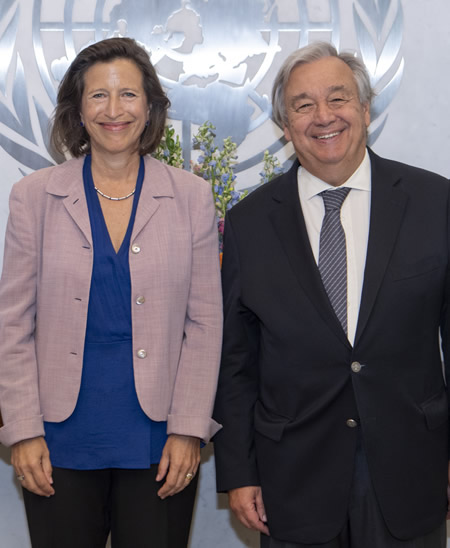
Photo: UN Secretary-General António Guterres swears in Melissa Fleming, Under-Secretary-General for Global Communications. 04 September 2019. United Nations, New York. UN Photo/Eskinder Debebe.
New York, NY — United Nations Secretary-General António Guterres has appointed Melissa Fleming of the United States as the next Under-Secretary-General for Global Communications.
She succeeds Alison Smale of the United Kingdom.
Ms. Fleming brings to the position more than 25 years of strategic vision, innovative management, and communications expertise. She worked in the UN in the fields of humanitarian action, conflict prevention, peacebuilding, and free media.
Since 2009, Ms. Fleming has been Head of Global Communications and Spokesperson in the Office of the United Nations High Commissioner for Refugees (UNHCR) in Geneva. While there, she led global media outreach campaigns, social media engagement, and a multimedia news service serving audiences ranging from media, public, donors, Governments and refugees themselves.
Ms. Fleming joined UNHCR from the International Atomic Energy Agency (IAEA), where she served for eight years as Spokesperson and Head of Media and Outreach. Before IAEA, she headed the Press and Public Information team at the Organization for Security and Co-operation in Europe (OSCE). Earlier still, she served as Public Affairs Specialist at Radio Free Europe/Radio Liberty in Munich, Germany.
Having begun her career as a journalist, Ms. Fleming held the position of Senior Advisor and Spokesperson on the transition team of the current Secretary-General from 2016 to 2017.
She holds a Master of Science in journalism from the College of Communication, Boston University, and a Bachelor of Arts in German studies from Oberlin College, Ohio, United States.
Source: United Nations, New York
|GlobalGiants.Com|







Edited & Posted by the Editor | 4:47 PM | View the original post
August 29, 2019
Climate Activist Greta Thunberg Arrives in New York by Sailboat
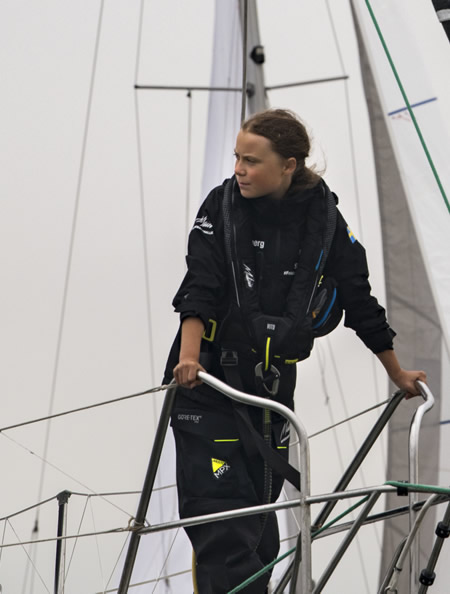

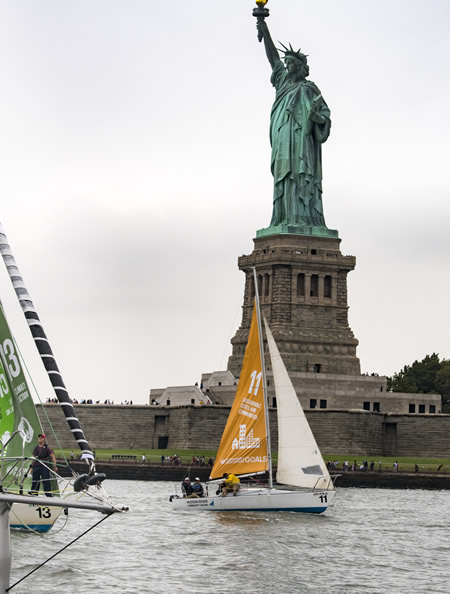
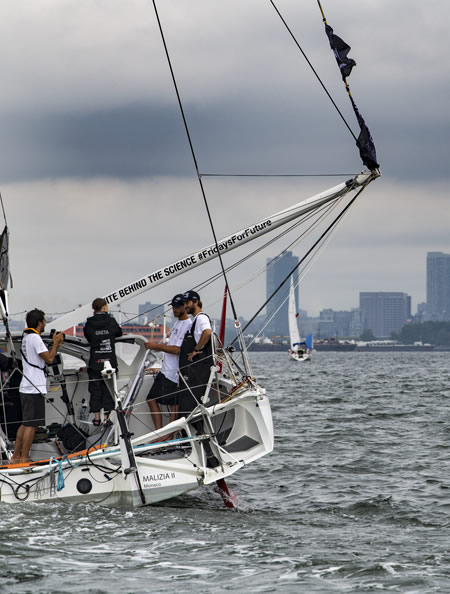
Photos: Greta Thunberg, the 16-year-old climate activist from Sweden, sailed into New York Harbor today flanked by a fleet of 17 sailboats. Each sailboat represents one of the Sustainable Development Goals on their sails. Greta Thunberg embarked on a trans-Atlantic voyage on 14 August from Plymouth, England to New York City on a solar-powered, zero-emission racing boat, the Malizia II. She would be attending the UN Climate Action Summit in New York in September. 28 August 2019. New York, New York. UN Photos/Mark Garten.
Source: United Nations, New York.
|GlobalGiants.Com|







Edited & Posted by the Editor | 1:38 PM | View the original post
August 27, 2019
G7 SUMMIT 2019: G7 LEADERS ISSUE DECLARATION
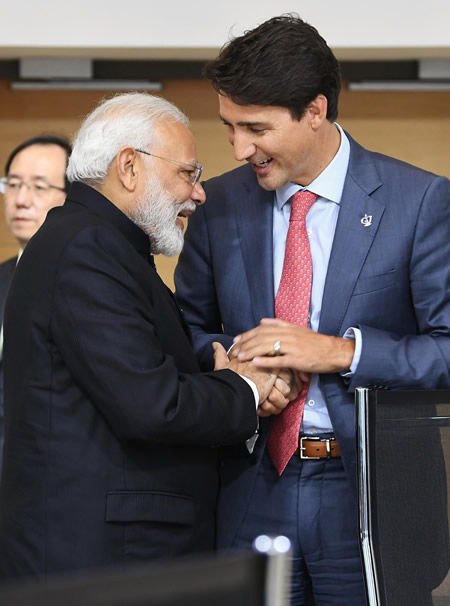
Photo: Prime Minister Narendra Modi of India with the Canadian Prime Minister Justin Trudeau at the G7 Summit, in Biarritz, France, on 25 August 2019.
Following is the Declaration issued by the G7 Leaders after the G7 Summit 2019 in Biarritz, France:
26 AUGUST 2019
The G7 Leaders wish to underline their great unity and the positive spirit of the debates. The G7 Summit, organized by France in Biarritz, has successfully produced agreements by the Heads of State and Government themselves on several points summarized below:
• Trade
The G7 is committed to open and fair world trade and the stability of the global economy.
The G7 requests that the Finance Ministers closely monitor the state of the global economy.
The G7 wishes to overhaul the WTO to improve effectiveness about intellectual property protection, to settle disputes more swiftly and to eliminate unfair trade practices.
The G7 commits to reaching in 2020 an agreement to simplify regulatory barriers and modernize international taxation within the framework of the OECD.
• Iran
We fully share the objective to foster peace and stability in the region.
• Ukraine
France and Germany will organize a Normandy format summit in the coming weeks to achieve tangible results.
• Libya
We support a truce in Libya that will lead to a long-term ceasefire.
We believe that only a political solution can ensure Libya’s stability.
We call for a well-prepared international conference to bring together all the stakeholders and regional actors relevant to this conflict.
We support in this regard the work of the United Nations and the African Union to set up an Inter-Libyan conference.
• Hong Kong
The G7 reaffirms the existence and importance of the Sino-British Joint Declaration of 1984 on Hong Kong and calls for avoidance of violence.
The G7 or ‘Group of Seven’ are Canada, France, Germany, Italy, Japan, the United Kingdom, and the United States. It is an intergovernmental organization that was formed in 1975 by the top economies of the time as an informal forum to discuss pressing world issues.
Prime Minister Modi of India was invited to attend the Summit as a special guest of French President Emmanuel Macron.
Source: G7-2019, Biarritz, France.
|GlobalGiants.Com|
Ils travaillent depuis des mois à des propositions concrètes et ambitieuses visant à lutter contre les inégalités : à la veille du G7, les entreprises, ONG, associations et citoyens présentent leurs recommandations à @EmmanuelMacron, qui ira les défendre demain au #G7Biarritz ! pic.twitter.com/mQg3G6AG7G
— Élysée (@Elysee) August 23, 2019
[A renewed format for the G7]
— G7 France (@G7) July 25, 2019
👉 To fight the battle against inequality, France 🇫🇷 is adjusting the format of the group, involving new partners.
India 🇮🇳 and its Prime Minister @narendramodi will be in Biarritz for the #G7France! pic.twitter.com/DMWCdr6LZl
Leveraging technology to empower our planet…
— Narendra Modi (@narendramodi) August 26, 2019
Spoke at the session on Digital Transformation at the @G7 Summit. Highlighted the power of transformative technology, furthering innovation and how India is using technology to further innovation and promoting digital payments. pic.twitter.com/wwsG4iMjDn







Edited & Posted by the Editor | 7:37 AM | View the original post







